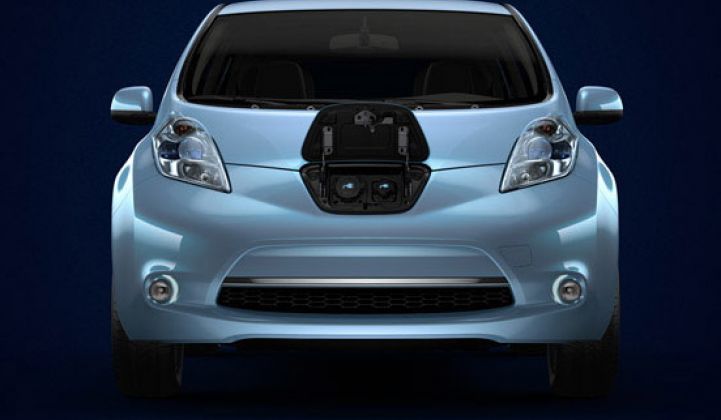I attended a media roundtable and a lecture with Nissan-Renault CEO Carlos Ghosn at Stanford University's Institute for Economic Policy Research (SIEPR) on Monday. Forbes called Ghosn "the hardest-working man in the brutally competitive global car business." Ghosn was on the Stanford campus to attend his daughter's graduation.
Ghosn wouldn't say anything negative about the Tesla or Chevy Volt -- but he did have a lot to say.
- In 2010, there were 73 million cars built globally. Only 20,000 were EVs.
- In 2020, 85 million cars will be sold and 10 percent or 8.5 million will be electric, according to the auto exec.
The reason this market won't grow faster, according to Ghosn, is because there is not enough investment. Only one group has decided to make a massive investment and that's Nissan -- with an investment of $5 billion so far in zero-emission vehicles. Ghosn said that the car industry is part of the global warming problem and now needs to be part of the solution. No major car company is investing in EVs like Nissan is, he added.
Ghosn noted that in the U.S there are 800 cars for every thousand inhabitants and 600 cars for every thousand Europeans, while China is at 50, India at 15, Indonesia at 35 and Russia at 300.
He asked, "Does anyone think that these countries are going to accept a lower standard of living than the average European country?"
With that number of cars soon to be on the road, driven by the developing world, the only breakthrough that can reduce the carbon footprint of transportation is zero-emission technology.
Fuel Cells, Batteries, and Range Anxiety
We can't get there with little five percent improvements, said Ghosn. Zero emissions will not come with hybrids -- they will be fueled initially by batteries and eventually by batteries and fuel cells. The CEO predicted that fuel cells will be part of the automotive picture "within the next ten years."
Ghosn's optimism on fuel cells is not shared by all, including Steven Chu and the U.S. DOE, which has curtailed much of the flow of research dollars going into fuel cells. Still, Ghosn remains committed to a fuel cell vehicle.
Still, for Nissan, the main problem is not attracting customers but satisfying demand. Nissan has orders for 22,000 units of the Leaf, but will only deliver 1,500 this month.
Andy Palmer, Senior Vice President of Nissan, in an article from April, said the company had produced 10,000 Leafs as of March, and more importantly, it’s sold every car that’s been built. “The question is, as we ramp up the factories in the U.K. and the U.S.," he said, “how can we get the pragmatists to adopt?”
One way to get wider uptake of EVs is to talk pragmatism (although car buying and pragmatism do not always go hand in hand). He noted that one-third of European customers never drive more than 100 miles a day. “If everyone bought rationally, then there’s a huge customer base.” Palmer also noted that the distribution of chargers today was more about reducing range anxiety than actually answering a need. Right now, no one knows if destination charging will really be used. Michael Kanellos covered range anxiety in the Leaf here -- and what looks like a definite need for destination charging.
Ghosn suggested these techniques for dealing with range anxiety:
- Innovation in better batteries
- Developing quick intervention systems. In Japan, if you have a charge problem, a service truck, currently in tests, delivers a fast charge.
- More chargers -- a mandate or incentive that ensures that every gas station, parking lot, government building, or supermarket must have a quick charger.
Ghosn suggested that people are not worried about range, but rather about accessibility to chargers.
Ghosn also said, "We'll see more revolutionary EVs coming in the future," noting that seating position, long determined by the existence of a large internal combustion engine, could change drastically.
He predicted that in 2011 Nissan will probably be the largest seller of EVs, with a capacity of 500,000 cars by 2013 in eight different body styles. Ghosn also predicted that young people will drive the growth of EVs.
The CEO wants to produce enough cars for the early adopters, saying, "We want to keep this audience happy." Japan has experienced some unexpected hurdles with natural disasters, but the 1,500 units shipping to the U.S. in June "should restart the enthusiasm. People want zero-emission cars and our duty is to make it a pleasant experience."



